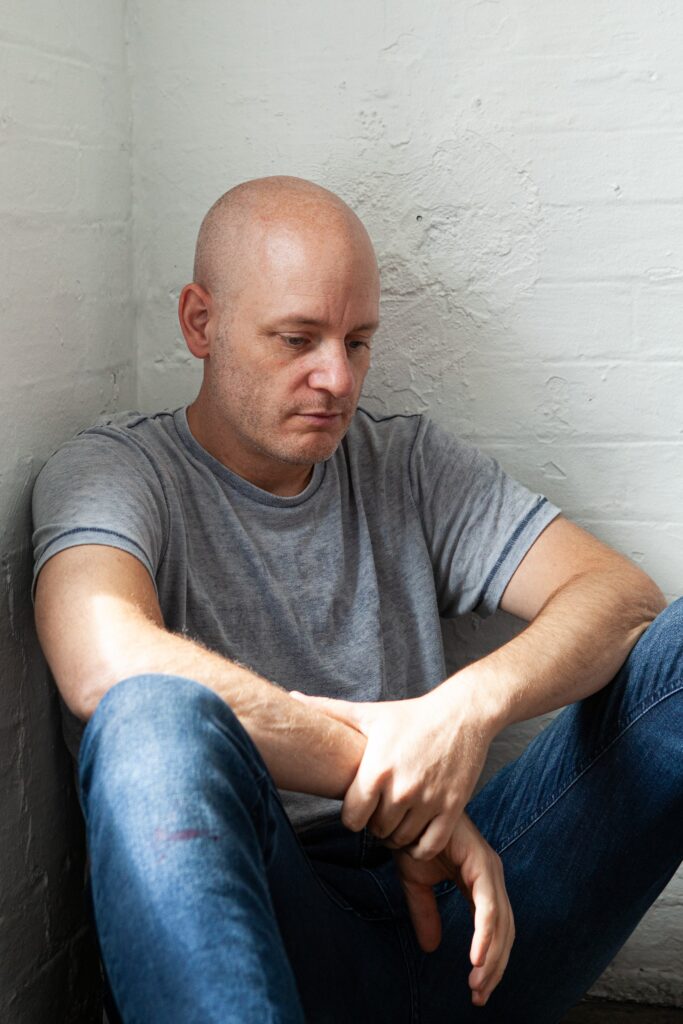Mental health, neurodiversity & suicide in the arts – and why you are most definitely not alone.

When I gave up my previous career and became an actor/writer/playwright, a work colleague and ‘friend’ told me ‘I must be mental’ – not a term that reeks of political correctness, but let’s overlook that for now, because despite an interesting language choice, perhaps there is a kernel of truth to what they said – but not for the reasons they thought.
According to Government statistics (Commons Library, UK Parliament) men are three times more likely to kill themselves than women. 6,588 people took their own lives in 2022. In my own life, I know three people who took their own lives and five more (that I am aware of) who tried without ‘success’. When I was 19, I once tried (admittedly badly, thankfully) to take my own life. I am now in the age group, 45-54, where the majority of men finally make that terrible choice.
At times my mental health takes me to dark places – but I’ve managed over the years to recognise the signs – to get to a place where I understand when those dark clouds are coming for me and know that I’ll get through it – but for a lot of people, they don’t have those coping mechanisms – it’s just too much and the results are heartbreaking.
Now, to be clear, I’m no psychologist and I don’t work in mental health – I’d struggle with the qualifications. No, I work in the arts, where I see more than my fair share of mental health issues. Why does this industry struggle so much? Neurodiversity, background, cultural pressures, lack of opportunity, poverty, the crushing lack of self confidence and imposter syndrome – I see these issues in people from all genders, backgrounds and ages. I am astounded by how many people I meet struggle with how their brains work – never mind the personal circumstances which exacerbate their mental state.
Critics will say that getting a ‘poor mental health badge’ is often seen as fashionable these days. Some people, for example, like to ‘vague-book’ – this is when someone posts on social media a cryptic message about how miserable/upset/angry they are to get attention from unwitting sycophants, then feed off the energy, getting dopamine hits from the sympathetic comments. After showering in sympathy, the next day they post positive motivational messages as if nothing happened – they’ve had their feed and moved on.
Maybe they are just attention seeking to increase their followers, revelling in a temporary label they use to their advantage – misery sells after all and people love a sob story, right? There is a lot of that of course – but we should also be careful, because even these behaviours are sometimes signs of real issues under the surface. This seemingly disingenuous behaviour from an attention seeking minority does deflect attention from people who really are suffering difficult mental health issues. It can make them feel like they are overreacting or being self indulgent and stop them seeking support, or when they do, their pleas though may get lost in the ocean of attention seeking and cause people to sigh and scroll past.
It’s also hard to help everyone who needs it – especially if you also suffer with own mental health challenges. What if you end up taking on their problems, absorbing their fears and worries and then have to live with that worry? What if you don’t say or do the right thing? The thing I have learned is that it’s not about that – it’s about listening and I’m still learning to be better at that. I was once accused of having Florence Nightingale syndrome – the need to save and fix everyone. The perceived stress of taking on other people’s problems has, in the past, made me walk past and be an unintentional bad Samaritan and it made me feel really shitty. But the thing is, I was doing it wrong. Nobody has ever asked me to fix them or their problems – just listen. So I’m still learning to listen more and talk less.
The fortunate quid pro quo of this, is that those people have been there and listened to me when I’ve been overwhelmed and needed to talk. They have listened far better than I did and arguably did a much better job of helping me than I did for them. They have been there for me and I cannot thank them enough. Talking about what is going on in my head helps me get clarity. Just saying the words out loud helps.
There is professional help out there for people too though… surely? Not as much as you would hope, sadly. According to The Royal College of Psychiatrists, 23% of people have to wait for at least 12 weeks for mental health support – 43% of those say their mental health condition worsened during the wait. 12% of people have to wait 6 months, 6% over a year. We are at a crisis point and whilst there are charities that help, they should not do all the heavy-lifting.
What caused this pandemic? It is not, as some people believe, alcohol, drugs, poor life choices etc… these are in fact symptoms of existing mental health issues and are often coping mechanisms or the only available roads for people.
In my own case, a difficult childhood living with an abusive, domineering, attention-seeking mother and a strict, endlessly frustrated and often angry father, meant I grew up with zero self-worth or confidence. My father’s father and his two brothers were all alcoholics too – I carry so much baggage from my genetics and my childhood that has never been unpacked by a therapist – it probably should be, but I found my own fragile coping mechanisms – I find some of those things too difficult to approach and drag up from the annals of my brain and worry opening those old files might do more damage than good – or maybe I’m storing up a time bomb?
How many mixed metaphors do I need here? I needed help throughout my adult life but never recognised that – even now, I’d rather just crack on, after all, I made it this far. See that red-flag, right there?
But the shadows of my past creep out. They deeply affect me and my ability to cope at times of stress or pressure. But the shadows are familiar to me – I know them; I’ve lived with them for years and in my own way, I understand them.
Having children was a help – a kind of therapy for me, I guess – I got to undo some of what happened to me by trying to make sure my sons grow up safe and loved – albeit I often question my parenting skills – please do not let me screw up my kids – the old imposter syndrome is never far away from the door, like a encyclopedia salesman, pushing it open with his foot and not taking no for an answer. I’m utterly terrified of being a terrible parent.
I found out after nearly 15 years of no contact, that my mother died last year. I phoned the family to tell them and not one person shared a moment of sadness. Nobody cared she had gone, including me. I felt a huge void where she should be, but nothing for her. No love, no loss, no anything and I found that terribly sad. I work every day to ensure my kids have different outcomes.
Call me a narcissist, but I want to be thought of fondly when I’m gone. Suffering from prostate cancer now for the last seven years, I’m hyper-conscious my life could take a bad turn and be cut short, the way it killed my father, with so much still to say that remains unsaid. I don’t want that for my kids. Or me frankly. Thankfully, the cancer, like all the other shadows, only rears its putrid head every so often when I await test results or have unrelated health issues. So I put it in that box with all the other issues, hoping it stays there. So far, so good. Unless you are a psychotherapist reading this, analysing my faults and telling me to explore the box…
Two years ago, I was diagnosed with ADHD. It was a huge relief and explained a lot about my poor mental health and childhood – it told me why I was perceived as a bit thick or naughty. I was always unable to retain information or concentrate and it severely affected my academic ability – surrounded by very clever friends was a constant reminder of my own ineptitude and stupidity. Compounded with my childhood, it turned me into a mess. I never felt like I had value, or I deserved to be loved – if you interviewed my wife or any of my previous relationships, they’ll tell you that living with someone with all these issues isn’t easy – I have a permanent feeling that I am doomed to failure; doomed to screw things up – the ever downwards spiral of depression pulls me in and sometimes, just getting up in the morning is a fight. A war. Against my own brain.
A lot of people reading this will know what I mean. The luckier of you will not. Someone on the radio recently, described ADHD as ‘like being in a room where there are twenty televisions on, all blasting out at once at the same volume and you are trying to concentrate on one’. Now imagine all those voices on all those TVs are trying to tell me I’m unworthy; I will fail; I deserve to lose; I do not deserve happiness. It takes a gargantuan hulk-like effort to push those voices away and be the optimistic person people think I am and the person I want to be. Yet even when things are going well, I’m on constant alert for the next disaster.
Seth (my co-writer) and I, wrote a lot of ourselves into our play – not to preach, but to lay out bare to an audience what it’s like to exist in the head of someone who fights these demons daily – or as Alan (the protagonist that Seth plays) says, ‘the monster that whispers thoughts of peace’ – thoughts that this can all end. What you see on stage when you see Past tents is the visceral ‘truth’ and perhaps that’s why it resonates so deeply with people. We wrote the play to raise awareness and selfishly, for our own catharsis. I’ll update you if it works.
AFEM (The Association For Electronic Music) carried out a study in 2022 and spoke to people within their community to talk about neurodiversity. 58% demonstrated a neurodiverse condition (such as ADHD, autism, dyspraxia or dyslexia or others) with only 38% diagnosed. In fact, the author, Tristan Hunt added that he feels up to 75% of adults are undiagnosed in general. In his words “The neuroscience out there shows that people who have things like ADHD and dyslexia, for example, are among some of the most creative people”, because the neurobiology is different in such a way that enables this very radical, nonlinear thinking to happen.” The arts in general, mimics the results of this study.
The arts are mostly not as academic as say, history or science where remembering facts and dates is vital – something someone like me really struggles to do. It also offers a strange sense of catharsis – in my case the ability to pretend to be other people whose lives are different to mine – the chance to explore the human soul in a way that doesn’t require me to write a complicated thesis or remember anything other than lines (and boy, do I struggle with them). I’ve always been attracted to stories about people who defy the odds to succeed because every day feels like that to me – these are people I can understand, feel the pain of, share the success with.
According to The ICAEW (The Institute of Chartered Accountants in England & Wales) up to 20% of people in the UK are not considered neurotypical. That’s 13 million people – with 700,000 of them on the autism spectrum, 2 million with dyslexia. Some NHS waiting lists for diagnosis of Autism are 8 years long and according to the National Autistic Society, “45% of neurodivergent people have lost or left their job because of challenges due to being misunderstood.”
There is an army of us out there and we flock to the arts because we find a home there. We find other people like us – creatives who express themselves via art instead of maths, science or other subjects that won’t work for us. Rishi Sunak can shove his ‘everyone should do maths until 18’ up his arse, because it would have forced me and many like me out of school earlier, and shows a distinct lack of understanding that people are different from each other. Maybe make maths interesting in the first place? Relevant? But don’t shove it down my throat if the lesson makes me so stressed, I would rather skive off school, than attend a class where I feel completely stupid and humiliated for the entire lesson.
Don’t even get me started on this government’s treatment of the arts or how society works against working class people ever succeeding in them – privilege and nepotism is another article entirely. I must remember my ADHD – try and stay on track and not drift off subject too much. You probably think I already have (shit, there goes the imposter syndrome again). I’m not here to play the victim. Well, not today.
Now don’t get me wrong, there are huge numbers of neuro-diverse people who work perfectly well in so-called normal jobs – the civil service for example deserves credit for specifically recruiting people with these conditions – especially agencies like MI5, who find skills in neurodiverse people suit their work perfectly – but it is the arts that ends up being a safe haven for many of us.
I managed a successful career of 25 years in financial services before becoming an actor, playwright and screenwriter, but I was always considered a bit of a maverick; a bit too creative to really be trusted. I had to try harder than everyone else to be good – I had to work longer hours than most people just to function, pass industry exams that nearly killed me to study for (studying was never my strong-point) – it was a constant exhausting battle to succeed and not screw up too badly and of course a war against my own imposter syndrome – my own monster that constantly reminds me I’m not good enough.
That voice now tells me the same thing about my writing and acting – and I have to try harder to beat the voice than ever before – even publishing this article fills me with apprehension. People will hate it, they’ll get angry, they’ll post hate and it will hurt. My default: assume the absolute worst. I’m an expert at this – I wear my brain like a horsehair shirt and constantly flagellate myself with what I perceive other people think, never-mind what they do actually think. I am programmed to assume failure.
Despite this, my ADHD brain gives me some huge advantages too. The ability to work excessively long hours with focus on something I love; problem solve and fix things; build things; make things at speed; the incessant need to revise and improve my writing (you wouldn’t believe how many times I had to excessively review and revise this article and I bet you still find a bloody typo). My own brain gives me a unique perspective on other people and how their minds work – if I could have my ADHD removed, I think I’d keep it and take my chances because it forces me to prove myself every single day in an obsessive way – but the darkness that comes with it… oh the darkness.
For all their faults (another article I’m sure) Spotlight, the mandatory (don’t even get me started on that) casting site for UK actors (if you want to be taken seriously by casting directors), to its credit, has recently put a focus on mental health in our industry and offer tools to helps, as do Equity, the actor’s union – these services are often also available to non-members, but it is the traditional support that is sometimes easier to reach out to. The Samaritans, Manup? ANDY’s Man Club and many other mental health charities are particularly helpful. There is help out there. Our industry is improving but it cannot fix everything by itself.
If you are struggling, reach out to someone and talk. If someone reaches out to you – just listen. I am in awe of the help the above charities offer – so let them help you – do not wait until things are at their most bleak – seek help, seek support and don’t worry – there’s nothing to be ashamed of. Frailties are a part of being human – sharing them normalises them.
Despite what my ‘friend’ said, I don’t consider myself ‘mental’, whatever that even means – though I’m sure many will disagree – my brain just works differently to other people’s. All our brains are different and understanding that is often the key that helps us cope better with those differences and even revel in them.
Talking helps me and it can help you too.
David J Keogh 06/02/2024
If this article affected you or you just need to talk (or know someone who does) – here are some contacts that may help:
The Samaritans: 24 hour helpline: 116 123 or email jo@samaritans.org – there are also other ways to contact them here: https://www.samaritans.org/how-we-can-help/contact-samaritan
Manup? the men’s mental health charity: https://www.manup.how
Andy’s Man Club: https://andysmanclub.co.uk
Mind: https://www.mind.org.uk
The link to Past Tents the play: https://www.pasttentsplay.com


